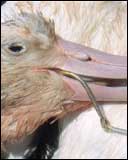|
By Severin Carrell
The Independent
Ministers accused of undermining sea bird convention.
1st February 2004
Global efforts to prevent hundreds of thousands of rare albatrosses being killed by tuna fishing have been thwarted because Britain has failed to ratify a new treaty, conservationists have claimed.
The convention comes into force today and marks the first attempt to stop the deaths of about 300,000 threatened albatrosses and petrels on "long-line" tuna fishery hooks each year, including 19 species of albatross close to extinction.
These fisheries, which exist to catch highly prized,
endangered bluefin tuna and Patagonian toothfish
for the US and Far Eastern fish and sushi markets,
use "long lines" that stretch for up to 80 miles.
Many of the boats involved are illegal, sailing
under flags of convenience.
Senior ornithologists at the Royal Society for the Protection of Birds warned that efforts to stop the bird deaths have been severely weakened because the UK has not endorsed the new treaty. Britain's credibility as a champion of marine conservation has also been damaged.
Britain's involvement in the treaty is seen as crucial because it owns many of the most significant breeding grounds for rare albatrosses in the south Atlantic, such as Tristan de Cunha, the Falklands, South Georgia and parts of the Antarctic.
Britain played a leading role in drafting the Agreement on the Conservation of Albatrosses and Petrels. It chaired the negotiations that set up the agreement in February 2001, and ministers have regularly pledged they would implement its measures.
However, unexpected legal and political wrangles have meant that Britain has been unable formally to adopt the treaty, which has meant it has come into force at least a year later than expected.
The treaty has now been triggered only because South Africa formally ratified the agreement late last year, joining Ecuador, Australia, New Zealand and Spain.
John O'Sullivan, the RSPB's international treaties adviser, said: "Albatross and petrel are dying in their tens of thousands, and any delay is bound to lead to more deaths."
He said the delays meant that the first meeting to open talks on what kind of safety measures should be introduced would not be held until October at the earliest.
The spectacled petrel is causing particular concern for conservationists. It is one of two "critically endangered" birds in the UK's overseas territories. Only 4,000 pairs survive on Tristan de Cunha, but about 750 birds are killed every year off Brazil's coast alone. Elsewhere in the UK's territories, numbers of wandering, black-browed and grey-headed Atlantic yellow-nosed and sooty albatrosses are all in decline. However, since signing the treaty in 2001, the Department for Environment, Food and Rural Affairs (DEFRA) has encountered a series of legal and political obstacles that it failed to predict.
DEFRA discovered that the measures included in the treaty could clash with European Union rules on trade. It also found it was more complicated than originally thought for Whitehall to control the laws and behaviour of territories such as the Falklands and Tristan de Cunha.
Top
|

